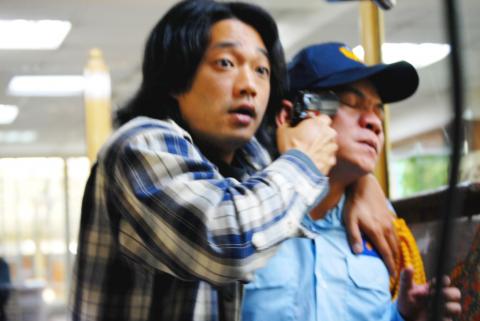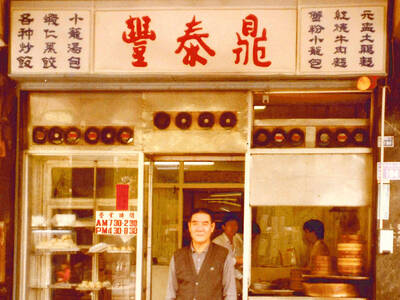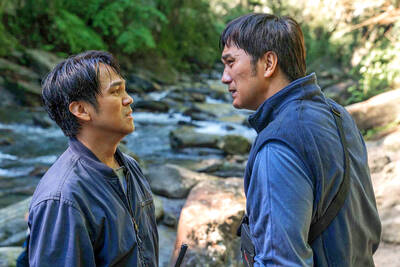Lou Yi-an (樓一安) has had a recurring dream since childhood. In the dream, he stands alone on a stage. There is one word he needs to communicate, but he freezes. The audience laughs as he struggles to remember.
“It is a strange, vivid memory. I suddenly become aware of my own existence. What am I doing standing here? Why am I here at all?”
The dream becomes the opening scene of The Losers (廢物), the second feature film directed and written by Lou. In the film, the word he struggles to recall is “land.”

Photo courtesy of Lou Yi-an
Lou arrives to the interview wearing a T-shirt emblazoned with a McDonald’s logo with an upturned middle finger and “I’m fuckin’ it” written on it. When pushed for an answer on how he became interested in left-wing causes, he mentions Karl Marx, Lu Xun (魯迅) and Woodstock.
The filmmaker is frequently spotted at street protests; his films always center on the disadvantaged.
The Losers is no exception. Following Shiou, a failed actor, returning to his Greater Kaohsiung suburb hometown, Meinong (美濃), the film probes some of the difficult issues facing Taiwan’s farming villages. One involves what locals call “venomous dragon ponds” (毒龍潭) — sand and gravel companies buying up fertile land from elderly farmers, which they turn into gravel extraction sites while selling the soil for whopping profits. The companies then refill the farmland with medical waste and other scrap upon which houses are to be built later.
Such operations are a common occurrence in Taiwan’s countryside, and Meinong is one of the areas where the shady business is out of control, Lou says.
Lou and his crew were able to film one of these sites, but had to ask the local police to “guarantee” their safety.
“The sand and gravel business can, you know, spell danger,” the director says.
It is the kind of danger touched upon in a sequence in which Shiou stops by the extraction site, trying to take a photograph as a piece of evidence. A man looking like a hoodlum appears out of nowhere and chases him away.
RURAL PROBLEMS
Originally a project commissioned by Hakka Television Service, the film draws its inspiration from the defunct Hakka band Labor Exchange’s (交工樂隊) Night March of the Chrysanthemums (菊花夜行軍), an epic album telling of a young Hakka man returning to Meinong to become a flower farmer and raise a family with his Indonesian wife.
“I have this strange attachment to Meinong because of Lin Sheng-hsiang’s (林生祥) music. It inspired me to learn about this place … It just so happens that lots of things I am particularly concerned about are happening in Meinong,” Lou says.
For Lou, all the issues revolve around the idea of land, its value and people’s relation to it.
“When you enter the town, there are real-estate ads everywhere you see … Farmers are too old to farm, and their children are not coming back. The land is unused, waiting for the right price,” he adds.
While dealing with unsavory issues — land exploitation, drug abuse, rural poverty — Lou’s film doesn’t differentiate the good guys from the bad guys, or draw a clear line between right and wrong. Each of the characters is on their own, striving to find a place in the world.
“I don’t want my characters to make demands, take action or affect change, because that’s not what happens in real life. Most kids who live in rural areas don’t think, of or are incapable of, fighting for a cause … I don’t want to make a statement. I see problems, put them into my works for people to see,” Lou says.
SOCIAL AWARENESS
Lou and Singing Chen (陳芯宜), his long-term collaborator, are among the most socially conscious filmmakers of their generation. Together, the two have made several feature-length and short works including Chen’s God Man Dog (流浪神狗人), Lou’s debut feature A Place of One’s Own (一席之地, 2009) and his award-winning short Waterfront Villa Bonita (水岸麗景, 2007). Their oeuvres look at the vices and virtues of Taiwanese society through characters who are social misfits, dispossessed Aborigines and members of the deprived and the displaced.
However harsh the reality is that the filmmakers address, they always manage to reflect it with a dark sense of humor, making the unbearable absurd and comic. Chen prefers magical realism; Lou’s direction is more inclined towards realism.
“The more I have seen, the more I feel that it won’t work if you tell people: ‘fuck, let’s overthrow the government.’ They will be like: ‘oh crap, here comes the mob again.’ It is better when these things are implied,” Lou says.
However, with no big names in the cast, together with the heavy subject matter, The Losers is no crowd pleaser. Lou says he was advised not to have the film theatrically released.
The film is currently playing at Taipei’s Spot Huashan Cinema (光點華山電影館) for one week. It was the only theater willing to show it, and the run ends tomorrow.
However, Lou isn’t discouraged. He hopes that the film will have “a longer life” and to be shown through different venues and events such as college campus tours.
“I don’t particularly love films. I make films because I have something to say … The Losers is a story I really want to tell. It is important that it reaches as many people as possible.”

March 24 to March 30 When Yang Bing-yi (楊秉彝) needed a name for his new cooking oil shop in 1958, he first thought of honoring his previous employer, Heng Tai Fung (恆泰豐). The owner, Wang Yi-fu (王伊夫), had taken care of him over the previous 10 years, shortly after the native of Shanxi Province arrived in Taiwan in 1948 as a penniless 21 year old. His oil supplier was called Din Mei (鼎美), so he simply combined the names. Over the next decade, Yang and his wife Lai Pen-mei (賴盆妹) built up a booming business delivering oil to shops and

Indigenous Truku doctor Yuci (Bokeh Kosang), who resents his father for forcing him to learn their traditional way of life, clashes head to head in this film with his younger brother Siring (Umin Boya), who just wants to live off the land like his ancestors did. Hunter Brothers (獵人兄弟) opens with Yuci as the man of the hour as the village celebrates him getting into medical school, but then his father (Nolay Piho) wakes the brothers up in the middle of the night to go hunting. Siring is eager, but Yuci isn’t. Their mother (Ibix Buyang) begs her husband to let

The Taipei Times last week reported that the Control Yuan said it had been “left with no choice” but to ask the Constitutional Court to rule on the constitutionality of the central government budget, which left it without a budget. Lost in the outrage over the cuts to defense and to the Constitutional Court were the cuts to the Control Yuan, whose operating budget was slashed by 96 percent. It is unable even to pay its utility bills, and in the press conference it convened on the issue, said that its department directors were paying out of pocket for gasoline

On March 13 President William Lai (賴清德) gave a national security speech noting the 20th year since the passing of China’s Anti-Secession Law (反分裂國家法) in March 2005 that laid the legal groundwork for an invasion of Taiwan. That law, and other subsequent ones, are merely political theater created by the Chinese Communist Party (CCP) to have something to point to so they can claim “we have to do it, it is the law.” The president’s speech was somber and said: “By its actions, China already satisfies the definition of a ‘foreign hostile force’ as provided in the Anti-Infiltration Act, which unlike